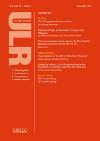Utilities Law Review - Volume 23 - Issue 2

Articles
Proposed changes to the Renewable Transport Fuel Obligation
Steve Dalton, Reza Dadbakhsh, Sarah Pollock and John Williams
Herbert Smith Freehills, London
This article offers an overview of the key elements of the UK’s Decarbonisation Strategy published in March 2021, and considers what future legislation and regulation mighthold for the energy and infrastructure sectors
Telecommunications access regimes: the New Zealand approach compared with the UK and EU
Robert Clarke
Clarke Mosby Consulting, Wellington, New Zealand
An access regime is a critical component of a well-functioning telecommunications regulatory system – something New Zealand learned the hard way in the 1990s. This article introduces readers to the access regime in New Zealand’s Telecommunications Act 2001, highlighting the ways it resembles but also differs from its UK and EU equivalents.
Proposed changes to the Renewable Transport Fuel Obligation
Steve Dalton, Reza Dadbakhsh, Sarah Pollock and John Williams
Herbert Smith Freehills, London
An overview of the key changes to the Renewable Transport Fuel Obligation recently consulted on by the United Kingdom Government as part of the move towardsreducing greenhouse gas emissions and decarbonising the transport sector in the United Kingdom
Case Comments
Implementation of the ECN+ Directive in Denmark
Frederik Jakobsen and Martin André Dittmar
Gorrissen Federspiel, Copenhagen
In transposing the ECN+ Directive into Danish law, significant changes have been made to Danish competition law. This article highlights key amendments which will affect entities doing business in Denmark. Changes include a new system of civil fines, the option of structural remedies to prevent competition infringements and increased parental liability
Ending the endless: cartel infringements end when competition is no longer restricted, the CJEU rules
Christian Ritz and Hubertus Weber
Hogan Lovells International LLP, Frankfurt
In its recent Kilpailu- ja kuluttajavirastojudgment the CJEU has qualified its case law on the legal end point of cartel infringements: Cartel infringements end when they no longer restrict competition. The judgment will be of significant importance for the future prosecution of cartels in general and bid-rigging cartels in particular
EU Current Survey
Energy – Telecommunications and Digital Economy – Transport.
Edited by Peter Alexiadis
Gibson, Dunn and Crutcher LLP,
Brussels and Christoph Rabb
Wolf Theiss Rechtsanwälter GmbH &
Co KG, Vienna
UK Current Survey
Broadcasting – Energy – Telecommunications – Transport – Water
Edited by Philippa Young
Solicitor, Oxford
